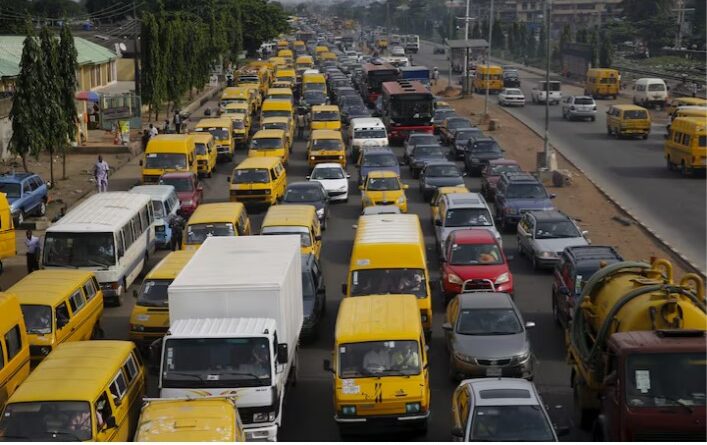How homegrown startups are boosting e-mobility in Africa
Africa’s cities are some of the most heavily congested in the world. In Lagos, Nigeria’s commercial capital, commuters often spend more than 30 hours each week, opens new tab stuck in grinding traffic. The dire consequences of this congestion are made worse by the fact that vehicles are typically older and more polluting than in developed countries. Research published in 2020 suggested that air pollution kills more than 11,000 people in the city each year.
A similar picture is visible in cities across the continent. Yet, outside of a few pockets, electric vehicles remain extremely rare on Africa’s roads. Electricity networks are unreliable across much of the continent, and public charging infrastructure is essentially non-existent in cities like Lagos.
However, at least in some trailblazing African cities, progress is being made. A growing number of cities are turning to electric buses for their public transport needs. And electric solutions are emerging for commercial drivers, especially of motorcycles.
Accelerating the growth of these green shoots will be vital if e-mobility is to emerge as a solution to help African cities combat air pollution and reduce carbon emissions.
Dakar became the latest city to inaugurate a fleet of electric buses, opens new tab in January. Some 120 vehicles are set to carry up to 300,000 passengers daily on the Senegalese capital’s new Bus Rapid Transit (BRT) system.
The International Finance Corporation acted as the lead transaction adviser to Senegal’s government for the project. Muneer Ferozie, head of public-private partnership advisory for Africa at the IFC, notes that in deciding whether e-buses make sense in a BRT system, cities must consider the lifecycle costs. “Electric buses are more expensive today, but maybe five years from now they will be at par,” he says.
Ferozie emphasises, however, that electric buses are not necessarily suitable for every city in Africa. Factors such as the reliability of the electricity supply need to be considered before electric buses can be rolled out, he says.
The overwhelming priority for most African cities is to improve public transport, rather than necessarily to ensure electric vehicles are adopted, Ferozie argues. “One needs to look at what’s the best and quickest and cheapest way of providing that solution,” he says. “Whether it’s e-mobility or not, it doesn’t matter.”
Dakar is one of several African cities to decide that electric buses do make sense. Lagos is also set to procure its own fleet of e-buses. But the two cities on the continent leading the e-mobility race are Nairobi in Kenya and Kigali in Rwanda.
Jit Bhattacharya co-founded BasiGo, an electric bus company that began operating in Nairobi in March 2022 and has since expanded to Kigali. He was inspired to launch the company during the COVID-19 lockdown, when the sudden removal of diesel buses from Nairobi’s streets led to a brief but drastic improvement in air quality.
More than 90% of Kenya’s electricity comes from renewable sources. “If you replace one of the 20,000 diesel buses here in the city of Nairobi with an electric bus,” says Bhattacharya, “you would immediately mitigate 50 tonnes of CO2 per year, which is a greater marginal impact on CO2 emissions than an electric bus almost anywhere else in the world.”
But environmental factors are not enough to persuade bus operators to switch to electric. As Bhattacharya acknowledges, very few customers can pay a “green premium” in Africa. But in Kenya, where fuel prices have risen by over 80% since January 2022, he says electric buses make financial sense.
While the upfront cost of an e-bus may be two or three times greater than a diesel vehicle, Bhattacharya says that fuel savings mean their lifetime cost is 25-50% lower in Kenya.
In these conditions, the challenge for BasiGo is to keep up with demand. Bhattacharya told The Ethical Corporation that the company has received 450 orders from bus operators in Nairobi and another 40 from Kigali. “That’s basically our next two years of production already spoken for,” he says.
As electric buses are taking off in Nairobi and Kigali, the two cities are also seeing electric motorcycles emerge as a solution for taxi and delivery drivers.
Alp Tilev, chief technology officer at Kigali-based e-mobility startup Ampersand, says that people “thought we were crazy” when the company was launched in 2016. Ampersand’s founders believed, however, that the rapid growth of electric motorcycles in China could provide a blueprint for Africa.
Eight years later, the company’s bet appears to be bearing fruit. Drivers purchase or lease an Ampersand motorcycle, then pay a fee to use the battery pack. Tilev says that the up-front cost of the electric motorcycles is roughly equal to a petrol or diesel alternative, but that drivers using Ampersand’s battery packs in Rwanda reduce their operating costs by more than one-third.
“The users that hop onto an Ampersand motorcycle, basically from day one, see that they end up with 35% more cash in their pocket,” he says. More than 2,000 Ampersand vehicles are now on the roads. The problem of charging is addressed through a battery swapping solution: drivers can go to a swap point when running low on charge and pick up a fully charged battery.
One of the other players in Kigali’s burgeoning e-mobility market is Bboxx, a UK-based startup that also offers various other green energy technologies. Bboxx has forged partnerships with several companies, including Ampersand, offering battery swapping for customers at its shops and distribution centres in Rwanda. The company also provides financing solutions for e-mobility customers.
“We want to be a platform for different vehicle types, while trying to keep the battery as interoperable as possible,” says Mansoor Hamayun, chief executive of Bboxx. He notes that “the whole equation has changed in the last three years or so,” with cheaper batteries making electric motorcycles much more competitive in African cities.
Bboxx is now looking to expand battery-swapping into more countries. And Hamayun says that the company is reviewing the market for four-wheel electric vehicles used by taxi and delivery drivers. “There is definitely an increasing user case for that as electric cars become cheaper,” he says, pointing out that some models manufactured in China are now “incredibly cheap”.
But it is not always straightforward to import electric vehicles, or their batteries. Elon Musk claimed in January this year that Tesla has not entered the South African market due to “super-high” import duties, opens new tab. These duties are higher for EVs than for petrol or diesel vehicles in South Africa, although other countries, including Ghana and Ethiopia, are now incentivising EVs.
In Kenya, Bhattacharya says that BasiGo needed to develop a local manufacturing capacity to be able to compete on costs against diesel vehicles. It uses a contract manufacturer, which assembles e-buses based on Chinese designs. He concedes that this limits how quickly it can deploy its buses, as the production line takes time to ramp up.
Nevertheless, Bhattacharya believes that establishing more local manufacturing capacity will be key for the e-mobility market to scale.
“The moment that you do that,” he says, “you’re not paying the (import) duties, you’re not paying the excise taxes, and it’s much easier for those EVs to be able to compete head-to-head against the combustion engine vehicles.”
Source: Reuters



